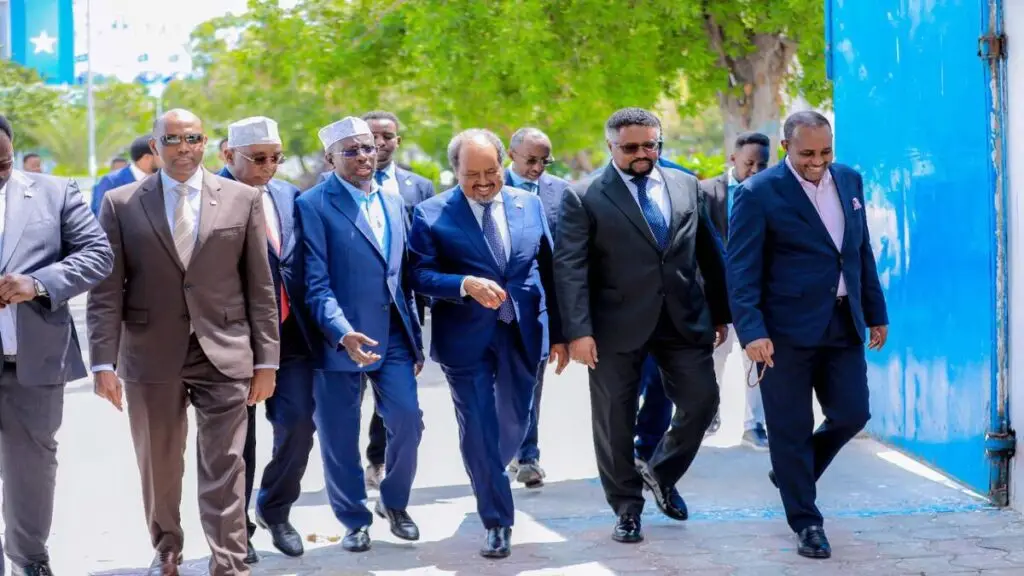MOGADISHU, Somalia — A war of words between Somalia’s president and opposition politicians is escalating, raising fears of renewed political instability and violence.
Federal government officials and opposition leaders traded sharp statements through local media, fueling intense public reaction and divisions.
The dispute follows the breakdown of talks between President Hassan Sheikh Mohamud and the opposition alliance, known as the National Salvation Forum, over electoral reforms.
Since talks collapsed, both sides have engaged in heated rhetoric, accusing each other of undermining efforts to deliver credible national elections soon.
Former Prime Minister Mohamed Hussein Roble accused the government of blocking consensus-based elections and reinstating a contentious constitutional chapter before implementing previously agreed reforms across Somalia.
Roble described the government’s stance as a major obstacle to Somalia’s democratic process, saying leaders should prioritize inclusivity over unilateral decisions.
President Mohamud countered by accusing opposition leaders of failing in their role to support the fight against Al-Shabaab, Somalia’s primary security threat.
Speaking from Dhusamareb, he also labeled opposition politicians as lacking a unified vision capable of advancing Somalia’s political and security priorities effectively.
He blamed the failed political dialogue on the opposition, alleging they seek a return to Somalia’s 2012 indirect electoral method.
“They even refused to discuss the matter,” President Mohamud said, defending his administration’s approach to constitutional changes and upcoming electoral reforms in fragile Somalia.
Prominent opposition figure Abdirahman Abdishakur pushed back, rejecting claims that opposition groups derailed talks and instead blaming President Hassan Sheikh for the political stalemate.
“Mr. President, the public knows you were supported in the anti-terror fight, but accountability for constitutional failure rests with you,” Abdishakur said.
He further accused the government of corruption, nepotism, and mismanagement of public resources, claiming these issues sparked mistrust among Somali citizens and political stakeholders alike.
Ports Minister Abdulqadir Jama also entered the debate, accusing the opposition of trying to block one-person-one-vote elections that Somalis have long anticipated nationwide.
He argued that universal suffrage is a constitutional right for Somali citizens, criticizing opposition leaders for resisting progress toward a modern, democratic electoral system.
Analysts warn the sharp rhetoric could collapse any remaining trust and fuel political violence similar to deadly confrontations witnessed during Somalia’s 2021 electoral crisis.
“If dialogue completely breaks down, history could repeat itself with armed factions clashing in Mogadishu,” said Mohamed Aden, a political analyst based in Nairobi.
Another analyst, Asha Yusuf, warned the consequences could extend beyond politics: “A security vacuum could embolden Al-Shabaab and threaten fragile gains made in recent years.”
Abdishakur Ali, a Global Affairs Analyst, warned Somalia faces a decisive year as President Mohamud’s constitutional term approaches its final stretch.
He said without urgent de-escalation and dialogue, the political standoff could spark unrest similar to Somalia’s past crises and transitional power struggles.
“All we see is both sides risk losing legitimacy, and failure to act could lead to insecurity, economic decline, and deeper political fragmentation,” Ali said.
International partners have repeatedly urged compromise. “Without consensus, Somalia risks sliding into instability during a critical electoral period,” said a Western diplomat who requested anonymity.
Both sides maintain they are defending Somalia’s future. The government argues it remains committed to dialogue but will not allow political regression to persist.
The opposition insists the current approach cannot deliver a credible election and rejects what it calls a government-engineered system favoring entrenched political interests.
Observers fear verbal clashes could derail remaining chances of negotiation, leaving Somalia politically paralyzed as President Mohamud’s term nears expiration next year.
The heated rhetoric threatens to reverse recent efforts at dialogue amid concerns about governance and security in a nation already grappling with militant violence.
Many Somalis fear the dispute could escalate beyond words, recalling previous armed confrontations in Mogadishu when rival factions refused to compromise peacefully.
A similar breakdown under former President Mohamed Abdullahi Farmaajo triggered deadly clashes in 2021, killing civilians and damaging public and private property in the capital.
Analysts say avoiding a repeat of that scenario requires urgent de-escalation and renewed talks: “The cost of failure is far too high,” Aden warned.
